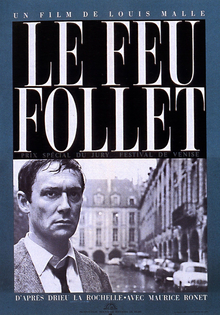Louis Malle is a famous French director so it’s sort of funny that the onl;y films we’ve watched so far by him have been his later American ones. It’s good then to go back to this earlier one that helped establish his career. Despite its year of release, this absolutely isn’t New Wave as it actually has a straightforward narrative. The main character Alain Leroy isn’t a person that I would ordinarily have much sympathy for, being a former alcoholic who has difficulty finding purpose in life now that he is sober. Yet Malle’s direction really spoke to me and I can see why this is one of Wes Anderson’s major inspirations.
Alain Leroy has sex with Lydia in a hotel room. From their conversation, we gather that Lydia is a friend of Alain’s estranged American wife Dorothy. For the past four months Alain has been living in a rehab clinic in Versailles to treat his alcoholism with only intermittent contact with Dorothy. Alain asks Lydia to stay with him but she has to return to New York and tells him to come visit. Back at the clinic, Alain is despondent and restless. The doctor says he is cured and should move on with his life but Alain is convinced that he will return to drinking and hides a handgun. That night he resolves to kill himself the next day and goes to sleep. The next morning he hitches a ride to Paris and cashes the check Lydia gave him. He goes to the hotel where he used to live and the staff welcomes him like an old friend, saying that the party scene isn’t the same without him. He spends the rest of the day meeting old friends, beginning with Dubourg who has settled down into a bourgeois married life with children. Dubourg notices the suicidal streak in Alain and invites him to live with their family for a while. But Alain replies that he is unable to accept mediocrity and moves on to meet his other friends.
There’s a lot of introspective narration in here and a lot of dialogue that I feel isn’t always coherent. Yet there is no difficulty or ambiguity in understanding what is happening and Alain’s trajectory is obvious. I’d even say that Alain’s line about killing himself deserves to be remembered as one of the great quotes of cinema. Alain’s lifestyle isn’t the kind of thing I’ve ever admired but I found Malle’s depiction of it to be masterful. We never get to see Alain in his prime. Instead we see its absence. Everywhere he goes, he meets friends who keep referring to how he used to be the life of the party and telling stories of his outlandish antics in the past. He used to be irresistible to women and even now retains a certain roguish charm as his reputation precedes him. We do however get to see Milou, who Alain himself remarks is his successor, living in the exact same hotel room he used to have and seamlessly inserting himself into fancy dinner parties and the lives of beautiful women. This suggests that the role is interchangeable and enjoyable as Alain’s company was, he will not be missed for long. The question the film poses then is, was it worth it for Alain to stop drinking and thus lose the fire that once animated him?
Like any good film, there are many layers of meaning in it. Dubourg’s middle-class lifestyle is only one of the many ways that Alain’s friends have moved on. One has fallen in with a circle of drug users. A pair of brothers who used to be Alain’s comrades in the Algerian War want to rekindle the fight. The wealthy Lavauds continue to live a luxurious life hosting intellectuals and favored guests to lavish dinner parties. None of these are appealing to Alain. Despite having had many women in his life, he bemoans the fact that none of them were ever truly his and none of them truly loved him. I’m not sure how much of this is just self-pity and I don’t think it’s all that coherent. Still, the imagery of the well-dressed and good looking Alain walking the streets of Paris on the last day of his life is striking and memorable.
This isn’t considered one of the great films of cinema and it doesn’t seem to me that it’s all that well remembered. But Malle does have a unique vision as a director and this is top notch work so I believe it’s currently underrated. I found this to be a fine film about suicidal depression and the struggle to find meaning after having a lived a life of excess.
